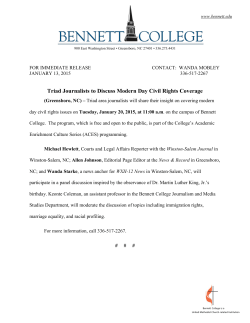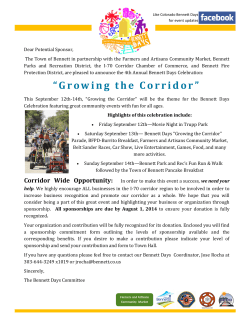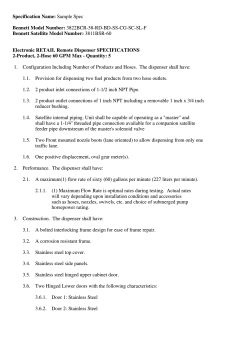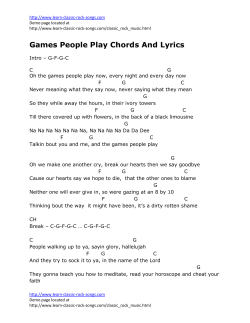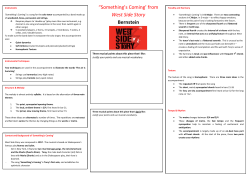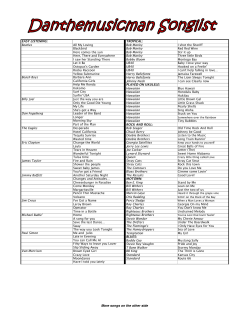
s Tony Bennett In a memorable Athens concert, Tony Bennett thrilled audience members
Tony Bennett In a memorable Athens concert, Tony Bennett thrilled audience members across the generational divide. s By Alan Flurry On the chance you had the opportunity to meet legendary entertainer Tony Bennett, do you know what you would say to him? If you are a member of the UGA vocal and instrumental jazz combo Classic City Jazz, you would, instead, prepare a song. After the October 6 concert by the thirteentime Grammy award winner, members of Classic City Jazz waited outside the Classic Center Theatre for the chance to serenade Tony Bennett. Though they had not been successful in securing a formal backstage invitation, the ensemble remained hopeful that they might show their thanks and admiration through song. “We were rehearsing and Mr. Bennett’s driver saw us singing. He turned the lights on and rolled the window down to hear. I think then he realized what we were and kind of what we were about–that we weren’t just waiting to mob him, and instead a group that does this music,” said Jessica Maples, an alto in Classic City Jazz. Fly Me to the Moon Eventually, Bennett emerged, as did members of his band and management team. The members of Classic City Jazz formed a semicircle around him and tried to return the favor for an evening of unforgettable music by one of the world’s biggest stars and greatest entertainers. The group had performed Duke Ellington’s “I’m Beginning to See the Light” during the spring semester performances, including their Jazz at the Chapel–St. Valentine’s Day Concert; hoping to get a November - December 2010 Tony Bennett surrounded by The UGA Classic City Jazz on October 6, 2010. chance to sing for Bennett, the group had relearned the song with a few changes, taking out the instrumental sections in preparation for an a cappella performance. “He just walked right over to where we were standing, and we sang it for him,” Joshua Elder, bass singer in the combo, said, still in disbelief. “Afterwards he said our harmonies were tight and we were pitch perfect,” Classic City Jazz vice president John Newsome said. “He said that if he had known we were there, he would’ve invited us up on stage to sing with him.” Newsome, who had tried without success to arrange for the group to be a part of the usual meet-andgreet, remained equal parts shocked, proud, and emboldened two days later that things had turned out as they had. Unsuccessful in his initial efforts, the group was undeterred and determined to meet the singer they adored. 5 Tony Bennett “Every song we love playing and singing, he performed that night,” Ricia Washington added. “His eyes were so beautiful and he was so nice,” said Lee Dining. “You felt invited to talk to him, even though you were star struck.” Even at 84 years old, Bennett’s tone shows no sign of fading. Other audience members corroborated this review on the still-wondrous voice of Bennett, who in graciously complimenting the acoustics of the Classic Center Theatre, asked that his microphone be cut and sang “Fly Me to the Moon” with only acoustic accompaniment. “It was so cool, because all night you had been hearing him through a speaker...and then you heard his real voice,” tenor Justin Miskin said. “There’s a difference.” Other audience members also noticed the students’ presence at the concert–several commenting to them that they were gladdened to see young people who knew this music and appreciated it with such enthusiasm. “We were very pleased that there were nearly 200 UGA students in the audience that night,” said George Foreman, director of the UGA Performing Arts Center. Bennett’s appeal across generational divides is well documented. “It has been a thrill that in recent years, the Beatles generation has had children and grandchildren and they all come to see me perform,” Bennett said, responding to questions through his management team. His extraordinary recording career has won him countless awards and accolades, including being honored with the “Citizen of the World” award by the United Nations. With his paintings in prestigious collections around the country, not only is Bennett an artist of the first order who remains connected to his working class, urban roots, he has also retained a strong sense of the 6 importance of arts education. In 1999, Bennett and his wife, Susan Benedetto, founded Exploring the Arts (ETA), a 501(c)3 nonprofit organization whose mission is to strengthen the role of the arts in American education by returning arts-enriched programming to public schools. ETA develops connections between private funding, individual artists, cultural institutions, and public schools as a way of achieving greater equality of resources and opportunity for youth of all means and backgrounds. “I know how fortunate I was growing up in New York City during the depression and being able to receive an excellent public school education in both art and music, as my family never would have been able to afford private lessons,” Bennett explained. “The arts and our expression of the artist is the connection to our shared humanity.” This rare focus of energy and influence also led Bennett to another idea that uses the arts to transform lives. In September, 2001, the Frank Sinatra School of the Arts officially opened its doors. A high school in Bennett’s hometown of Astoria, Queens, it offers a specialized program in the arts as well as a full academic curriculum. The school was first conceived by Bennett to honor his late friend and colleague. The school’s program offers pre-conservatory studio education in instrumental music, vocal music, fine arts, drama, and dance. A particularly striking feature of this special school is its commitment to community service through the arts. Students complete arts-related projects in hospitals, day care centers, senior citizen homes, and homeless shelters. Also known as Q 501, the Sinatra School of the Arts partners with cultural institutions such as the Metropolitan Opera, Battery Dance Company, Museum of Modern Art, and the American Theatre Wing to connect students with internships, apprenticeships, mentorships, and other programs and projects. Performance UGA The far reaching implications for the students, faculty, and associated partnering organizations of such a school is a tribute to Bennett’s vision, and the Frank Sinatra School of the Arts reaches all the way to the Hodgson School of Music. Joseph Brent, a Master of Music degree candidate in double bass performance and a tenor in the UGA Opera Ensemble, is a member of the first graduating class of the Sinatra school; Foreman arranged for a meeting between Bennett and Brent following his Athens concert. “I am indebted to Mr. Bennett, whose demeanor from the stage mirrors his youthful and sincere attitude in person,” Brent said. “I wouldn’t be the musician I am had it not been for his and his wife Susan’s determination in founding a school for the arts in our borough of Queens. Thanks to him, I am living a dream.” November - December 2010 Bennett’s advice for young artists–“work hard and be true to your art. Don’t compromise”–is something he lives everyday, and renews with every concert. Written into every contract is a clause that earmarks $1.00 for every ticket sold as a donation to the Frank Sinatra School of the Arts. The occasional tribute in song from young fans in a university jazz combo comes at no additional charge. For more information on Tony Bennett and his philanthropic endeavors, please visit www.tonybennett.net www.benedettoarts.com www.exploringthearts.org. Alan Flurry is Director of Communications for the Fine and Performing Arts at UGA. 7
© Copyright 2025
